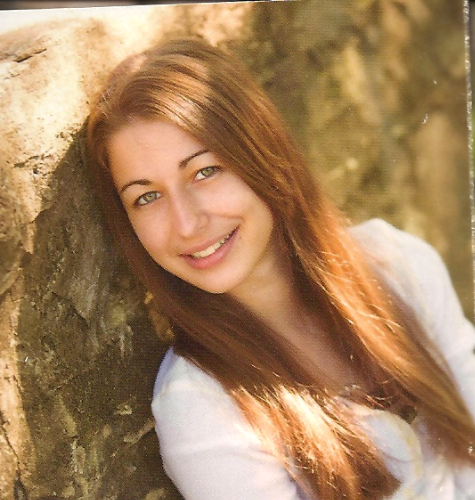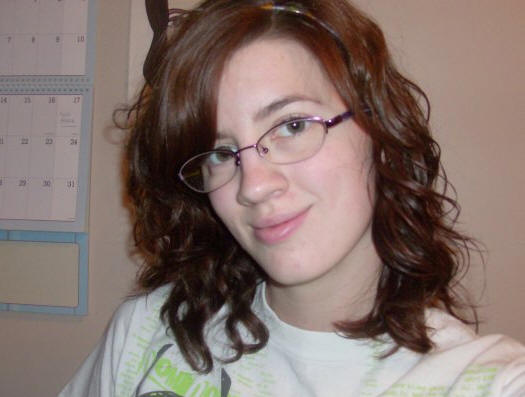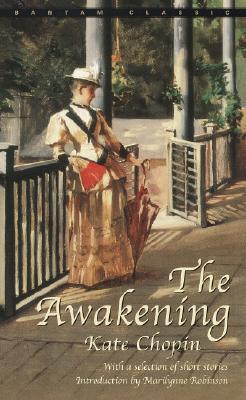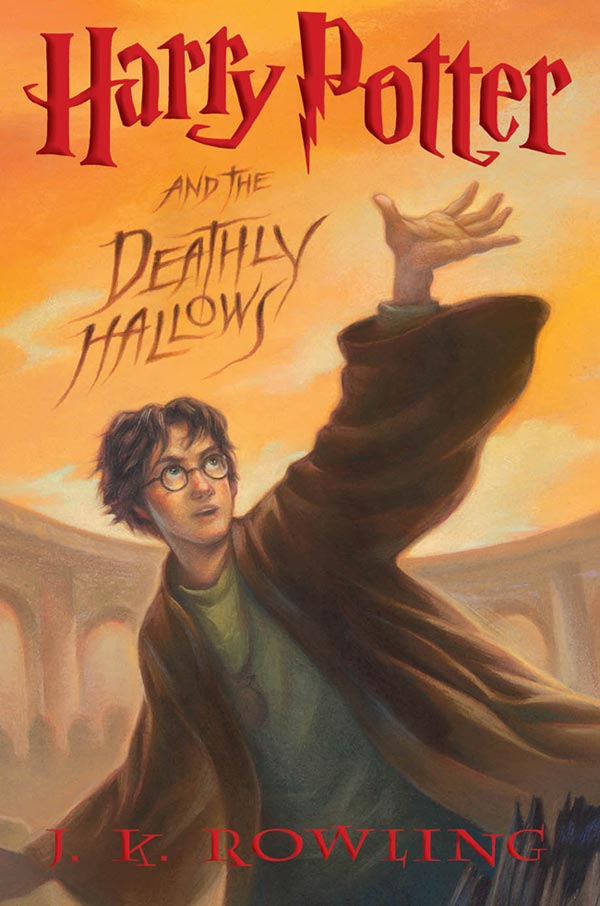|
|
In This Issue
The Blog:
Writing for the Future
 by Katie
Struck by Katie
Struck
Recently, I attended MBLGTACC
(Monosexual, Bisexual, Lesbian, Gay, Trans, and Ally
College Conference) with some of the other members
of the Monmouth College Spectrum group. At the
conference there were keynote speakers and workshop
leaders talking about ways to improve LGBTQA
(Lesbian, Gay, Bisexual, Trans, Questioning, and
Ally) groups and raise awareness about important
issues and information. I went to workshops on
topics ranging from "Myths and Misconceptions about
Kinky Sex" to "Trans Activism and Cis Privilege." As
soon as I got back to campus, I wanted to write
about what I learned, but I did not know what forum
to use, and then I thought of the largest audience
that I could possibly hope to get this information
to, the internet. I wanted to blog, but I had to
know what would make the best blog. How can a blog
both be shared publicly and positively affect the
local community?
As a regular Tumblr user, I
appreciate the work of bloggers. I even have two
pages on Tumblr that have some blog entries. I love
to read review blogs on movies and books like
http://feministfilm.tumblr.com/ and
http://noseinabook.tumblr.com/, learn about current
issues from activism blogs such as
http://fuckyeahbiactivism.tumblr.com/, and learn
about people from personal blogs like
http://highfunctioningdarklordofall.tumblr.com/.
While all of these blogs use blogging in a positive
and effective way, not all blogs are grammatically
correct or backed up with factual evidence, which
can create a problem. The problem is what makes a
good blog? Along with pulling from my own personal
experiences, I interviewed Bridget Draxler to get
some ideas.
Draxler is the Communication
Across the Curriculum coordinator and director of
the MC Writing Center. She has a background in
studying and using communication technology. She
said that one of the main misconceptions about
blogging, Twitter, and email is that they make
writing increasingly informal. While that is true of
many blogs, blogs can also be useful tools to
writers in and out of classes if they are used with
basic ideas of what is important in writing like
audience, content, voice, and grammar. When blogs
are used right, they should resemble reader response
papers, and the expectations for tone and voice
should be the same. Also, a positive effect of all
this new communication technology is that people are
writing more than ever. With this more public form
of writing, writers can get feedback from their
peers, and this authentic audience can make writers
hold their work to higher standards than if they are
just writing for themselves or an assignment.
Draxler suggests that writing
with the purpose of education or activism should
fuel changes within the local community and be
fueled by those changes. Often when people write
blogs about subjects like feminism, LGBT issues,
economic issues, or body positivity, then, they find
a like-minded community online where they can share
information. However, if bloggers do not use the
information that they learn from other's blogs to
better their community, then there is a separation
between those people and their communities and a
lost opportunity to brainstorm with community
members on how to improve small towns and cities
for all people.
Blogging when used right can be
useful for sharing, persuading, informing, and
evaluating just like the papers that Composition and
Argument students learn to write. The main elements
that bloggers should include in their blog entries
are attention to audience, voice, evidence, and
grammatical errors. Whether the blog entry is a
personal account about being in a relationship as an
asexual woman or an evaluative piece about the
latest John Green book The Fault in Our Stars, the
writing should be well crafted and passionate. The
Tumblr community seems to be eager to learn new
information and consider new ideas, so it is the
ideal place to foster creativity and personal
growth. At the same time, it has applications to
daily life and our college community as a place
where writers are in conversation with each other. I
encourage all writers to try blogging as a writing
outlet and look forward to continue blogging.
|
What
the 4-4 Means for the English
Department
by
Stevie Croisant
According to English
Department Chair Professor Mark Willhardt,
there are several changes to the curriculum
English majors should be aware of. The 4-4
plan, which was approved earlier this school
year, will be implemented for the Fall 2012
semester. The 4-4 plan has caused many
majors to reconstruct classes and
requirements for graduation. According to
Willhardt, the following changes will be put
into effect for next semester:
∑
The
English major goes from the current 11
course requirement for the major to 10.5
courses over the four years. The seven
required courses remain the same.
∑
For spring semester
2013, and regular intervals thereafter, the
English Department will be offering half
courses (a seven week intensive course) as
well as regular full-semester courses.
∑
Professor Hale will
offer Literature of the Civil War
in the first half of the spring semester and a
course on Oscar Wilde the second half.
∑
The department will
be moving to offer Advanced Creative Writing
and Creative Nonfiction in alternating
years.
∑
ENGL 343 and 348 (20th
Century British Literature and English
Novel) have been removed and replaced with
ENGL 337 and 339 (Genre Studies in British
Literature and Topics in British
Literature), which will parallel current
offerings in American literature courses.
∑
ENGL 350 will be used
for special topics courses.
∑
There is likely to be
an effort to make available an extra day in
the scheduling of class so that a MWF class
may have a Thursday slot as well, so
students may gather for group projects.
According to Willhardt,
professorsí expectations will increase with
the 4-4 curriculum.
ďExcellence is achieved
not by demanding more Ďseat timeí in class,Ē
Willhardt said. ďInstead, it comes with
dedication to the work outside of class-
reading, drafting essays, concentrated
thinking about topics and works- which the
reduction in number of classes allows us
all. By focusing more, we can achieve more.Ē
|
|
|
|
|
Embracing the Challenge: My
Experience in Senior Seminar
 by
Leanna Waldron by
Leanna Waldron
So, here it is. At long lastóthe pinnacle of my
career as a Monmouth College English majoróSenior Seminar.
I approached the class with mixed feelings of excitement,
apprehension, and anxiety.
Excitement for the books we would be reading and to be (after
five years) at the end of my undergraduate career.
Apprehension about the seeming-impossible tasks of writing a
20-25 page paper and giving a major presentation to, not only my
class, but other peers and members of the faculty.
And, for those of you who know me, the anxiety should come as
no surprise at all.
And now, a month and a half into the class, my
feelings have changed quite a lot.
I find Iím far less anxious about the class itself and I feel
much better about the prospect of doing the presentation and am
actually excited to get to work on the paper.
However, Iím becoming far more nervous about the realities
that go along with this class. Mostly: graduating.
Becoming an actual, real person with responsibilities other
than turning in papers on time and making it to meetings with my
professors is a scary notion.
Hardly anything in my life after graduation is set; important
things like where Iíll be living and working are still up in the
air. I do have a lot to
look forward to, but I also have a lot of stuff that is causing me
anxiety.
So, Senior Seminar has become my comfort during
this time of uncertainty.
And trust me, the irony is not lost on me.
This time next year, I will be working
full-time, hopefully at a job that I enjoy.
I wonít have homework and papers and presentations.
But I also wonít be constantly surrounded by English majors
and professors. So,
while most seniors at this time are just ready to get out in the
real world (or maybe just to get out of Monmouth), Iím making a real
attempt to savor the time I have left here.
Because Seminar is the only English class Iím taking this
semester, itís my last English class at Monmouth College.
Itís the last time Iíll have a real chance to discuss
literature in this sort of environment.
So, Iím embracing it with all stress it induces
in me (prone to anxiousness as I am).
While the class is incredibly stressful and anxiety-inducing,
itís good to embrace it because who knows whatís going to come next?
After Monmouth College, you could go somewhere thatís
far more stressful or you
could go somewhere thatís not nearly as fulfilling as the big finale
of your undergraduate career.
So my advice for all the freshmen, sophomores
and juniors reading is this: enjoy it.
Enjoy your classes and savor the challenge they bring you.
Because after itís over, you might actually miss itópapers,
presentations, professors and all.
|
|
|
|
Survey Says:

What is your favorite literary
couple?

Mr. and Mrs. Beaver from The Lion, the Witch, and the Wardrobe.
Perfect couple. Perfect romance.
- Robert Cook

The Brownings!
- Mary Bruce

William Wordsworth and Samuel Taylor
Coleridge, of course!
- Rob Hale

Edna and Leonce Pontellier from Kate Chopin's The Awakening.
-Chase Mowery

My favorite
literary couple are Zoe and Vanessa from Sing You
Home by Jodi Picoult. They are a really caring and
value each other. Plus, they support each other through
the trial and the troubles at work.
-Katie Struck

Ron and Hermione from The
Harry Potter series
-Ivy Bekker (& Leanna Waldron)
|
|
|
|

|

 by Katie
Struck
by Katie
Struck
 by
Leanna Waldron
by
Leanna Waldron





